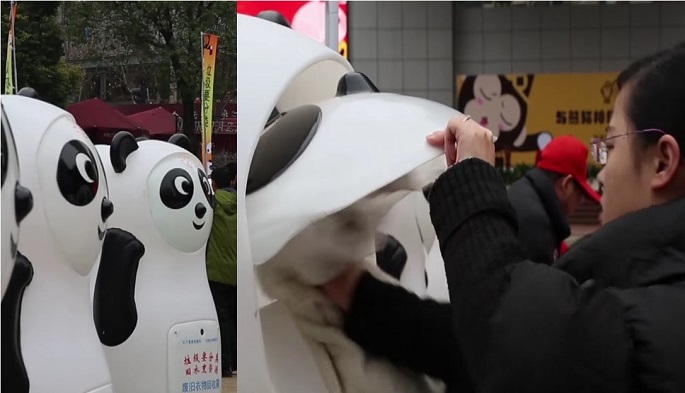Since 2012, sightings of Giant pandas in Shanghai have become commonplace. Many would approach them every now and then.
Well, not exactly those cuddly-looking, bamboo-chewing creatures but a prototype of sorts.
Some 2,000 bins designed to look like pandas can be found all over Zihongjiayuan, a residential area in Shanghai’s Hongkou District.
Aptly referred to as panda bins, they basically serve to collect used clothes.
Shanghai Yuanyuan, the one behind these eye-catching bins, is only but one of the companies donating secondhand clothes to the underprivileged members of society, reported Shanghai Daily.
The 1.8-meter-tall panda bins can hold 60 kilograms to 80 kilograms of weight.
The company equipped them with sensors placed on the ear part. Once they reach their maximum capacity, the sensors would automatically inform the collectors.
Talk about smart recycling bins.
Yang Yinghong, the founder and general manager of the 8-year-old company, said that they employ five full-time drivers who double as collectors. Every month, they amass 150 tons.
Based on their condition, usually 3 to 4 percent of the clothes get approved for donation.
The company commissioned 100 panda bins in 2015 to be specifically placed in 20 universities in Shanghai. The clothes will be donated to poor students.
Now a retired government official at 68, Yang said that his company aims to increase awareness on recycling clothes among the youth.
In 2012, they distributed two tons of used clothes in poor communities in Huangshan, Anhui Province. Another batch of clothes went to schools in Pudong, according to the official website of the municipal government of Shanghai.
One more “creature” partakes in collecting secondhand clothes for donation.
People can use the app Feimayi (“Flying Ants”) to have their used clothes be picked up. The clothes must weigh, at least, 10 kilograms to avail of the free service.
Ma Yun, Feimayi’s founder, said that his company donates 10 percent of the best secondhand clothes to the needy.
The Ningxia native and Shanghai University alumnus added: “We’re spending more on charity work because fewer non-governmental organizations are doing it because of the cost.”
They collected nearly 100 tons of clothes in 2016.
Another “Ma” likewise participates in this charity work involving used clothes.
Jack Ma's Alibaba Foundation joined forces with Shenzhen-based One Foundation, founded in April 2007 by Chinese martial arts superstar Jet Li, and Shanghai-based Deppon Logistics to launch the tracking app Cainiao Guoguo, reported China Daily.
In addition to tracking online donations such as brand new and secondhand clothes, the app offers pickup services.
Li Jianghua, the general manager of Cainiao Guoguo, said that the “transparency of the donation process” reassures people to give to charity.
Online charity shop Buy42 will put up actual shops in Shanghai on March, where people can bring their donations of secondhand clothes, according to Shanghai Daily.
“We hope the shops will enlighten the public about charity and get them involved,” said Yu Shiyao, the co-CEO and marketing director.
Established in 2011 and said to be the first of its kind in China, Buy42 prides itself on a work force comprised of a large number of people with disabilities.
Some 26 million tons of used clothes in the country, according to statistics provided by China Association of Circular Economy, are being thrown away every year, reported China Daily.
Perhaps it is high time to check one’s closet for old clothes or those that don’t anymore fit. Some people out there need an extra coat to keep themselves warmer.



























